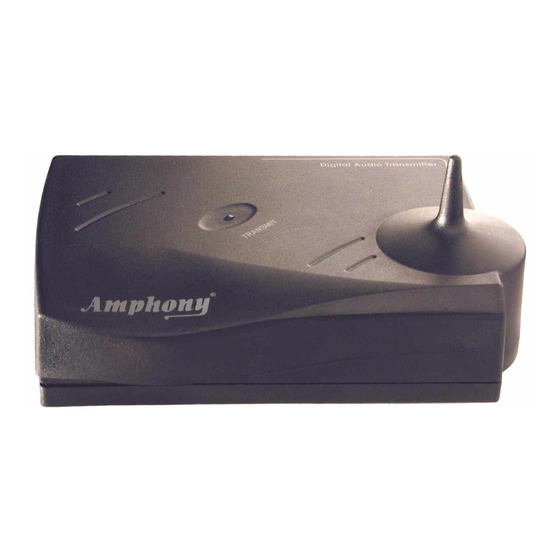Amphony L1550 Questions fréquemment posées - Page 2
Parcourez en ligne ou téléchargez le pdf Questions fréquemment posées pour {nom_de_la_catégorie} Amphony L1550. Amphony L1550 5 pages. 5.8 ghz digital wireless audio transmitter / amplifie
Également pour Amphony L1550 : Comparaison des caractéristiques (1 pages), Spécifications (4 pages), Manuel d'utilisation et d'installation (12 pages), Informations sur le produit (4 pages)

Q: How does the transmitter connect to my audio equipment?
A: The transmitter connects to any standard audio line output via the supplied stereo RCA audio
cable or to any standard amplified speaker output via the supplied speaker cable. The transmitter
can also be connected to other audio outputs, such as headphone outputs, by using an appropriate
adapter. The transmitter can be adjusted to the audio level provided by the audio source via a
transmitter volume control.
Q: Does the transmitter connect to the amplified speaker output of my surround sound
receiver?
A: Yes, the transmitter can be connected directly to an amplified speaker output.
Q: Is the technology used similar to Bluetooth or MP3?
A: Even though both our transmitter / amplifier and Bluetooth / MP3 use digital audio, there is a
fundamental difference between Bluetooth and how audio is transmitted by our transmitter.
Bluetooth is only able to transmit audio data at very low data rates reliably (typically up to 200 kbps).
Therefore, only compressed audio can be transmitted via Bluetooth. A commonly used technique to
compress audio data is MP3. Our transmitter, however, does not compress the audio and transmits
the full bit rate. As a result, the audio quality is not degraded such as with MP3. Also, the audio
latency (audio delay) of MP3 compressed audio is fairly high and thus not suitable for television or
surround sound applications. Since our transmitter does not compress the audio and since only a
minimum of data buffering is used, the audio delay is minimal.
Q: What is Forward Error Correction and why is it used by the transmitter / amplifier ?
A: Occasionally, there may be some data which is corrupted during transmission. This may be the
case when there is interference, such as other transmitters, electrical sparks or if you move around
and the signal is temporarily lost. Forward Error Correction as it is used by the transmitter / receiver
can in most cases repair the data which is received to guarantee 100% correct data reception and
therefore 100% correct audio reception.
This technology is in part responsible for the high robustness of the transmission. With analog audio
transmitters you may have noticed 'clicks' or 'pops' during sparks which often occur when switching
on appliances.
Q: Can this transmitter / amplifier be used to transmit surround sound to rear speakers ?
A: Yes. In this case the transmitter needs to be connected to the two rear speaker channels of your
surround-sound decoder. You can either use a line-level audio output if available or an amplified
speaker ouput. Both outputs can be connected directly to the transmitter.
© 2004 Amphony
2
